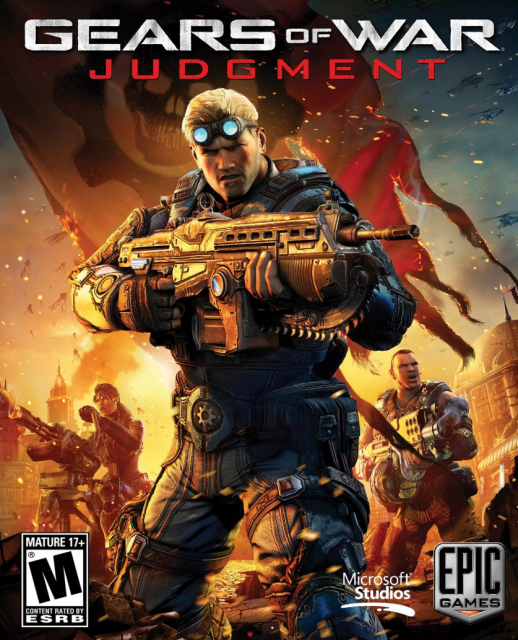A Well-Oiled Machine
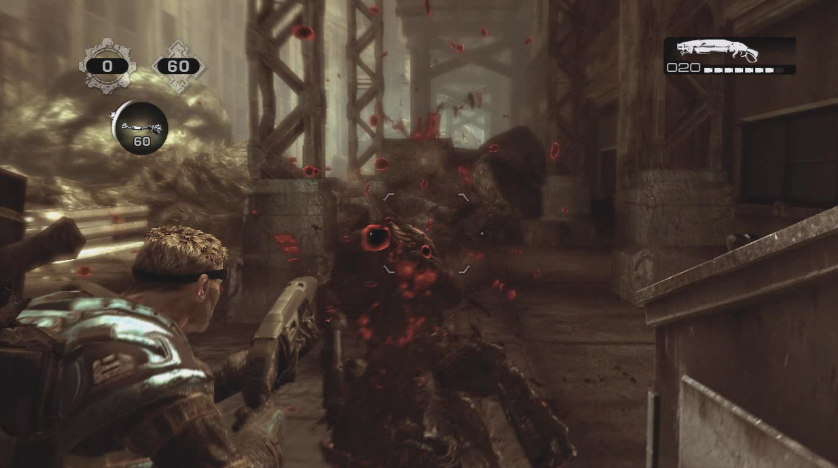
My reception to the Gears of War series as a whole has been fairly lukewarm. I saw the original game as a decent offering from Epic and there’s no doubt that the cover system it pioneered was one of the most important additions to modern shooters. It made strategy and use of space in action games not just a matter of mastering and feeling powerful in the field of offense but also defence. However, Gears 1 was also a game where the characters felt frequently bulky and cumbersome to maneuver, the snap-to-cover system felt too restrictive and magnetic, and the game favoured hunkering down for long periods in one place over dynamic movement across maps. Gears also became the epitome of the hollow grim-and-grittiness that has pervaded so much of the modern medium. A lot of people have criticised games like Gears for having a dull and narrow colour palette, but I think that’s a bit of a mistake. Limbo used a narrow colour palette, MadWorld used a narrow colour palette, many of the greatest films ever created were in black and white, and in these pieces of media we can see the small range of colours not as a hindrance to their aesthetic but as something that provides a key visual elegance. In something like Gears however it felt there was little to back up that aesthetic and so tonally it didn’t come together.
It’s true enough that there was something tongue-in-cheek about a lot of what Gears did with its characters, but it also expected to conjure up sincere sombreness and seriousness in a world defined by ridiculously proportioned meat men who frequently rammed their chainsaw guns into aliens while yelling “Nice”. The environments and brief glimpses of earnest emotion in Gears suggested that “War is hell”, but everything else suggested that “War is sick bro”. It's a reflection of Bleszinski's original plan for Gears to be a sci-fi Band of Brothers, but how he ended up with something closer to Predator instead. These are problems the series never managed to entirely shake, but they got better over time. By Gears of War 3 it felt like the gameplay was better filling out its clothes, movement was less stiff, and there was even some greater diversity in the narrative and visuals.
Judgment doesn’t manage to take the series beyond the problems of previous Gears games, but it is an experience that deserves to be remembered better than it is probably going to be. Falling outside the main series and at a glance appearing to be nearly identical to Gears 3, it might not be your first candidate for a title that deserves a prime spot in the halls of gaming history, but it’s a game that manages to emphasise the best in Gears’ mechanics and pushes the basic concepts behind the series to their operating peak. Judgment acts as a prequel for the previous games and slots into its main roles Kilo Squad, a four person collective of COG soldiers consisting of returning characters Damon Baird and Augustus Cole, and newcomers Garron Paduk and Sofia Hendrik. Throughout the game the squad undergo an intense grilling at a military tribunal in which they’re accused of insubordinate actions and the Player One control switches between each of the four characters as you play through their recollection of the events leading up to the trial.
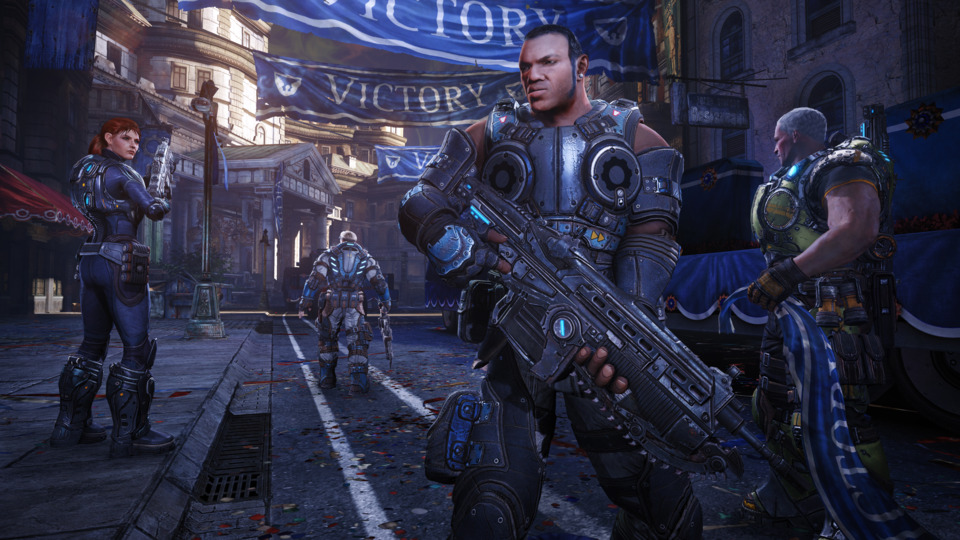
While much of what you see in these missions involves resurrected gameplay ideas from Gears past, the best design decisions here really ram home the truth that a game is not just defined by what mechanics it has but how those mechanics are arranged and integrated. The two big new ideas in Judgment are the Declassified Missions and the Star Meter. The game now features a bar in one corner of the screen which fills as you take down your enemies. Regular kills provide just a sliver of progress towards your end goal, but more gruesome kills like headshots, gibs, and melee executions pay out more. At the end of each of the chapters you receive a number of stars from one to three based on how far you filled that meter. The stars generally feel like a worthwhile reward in themselves, but they also count towards unlocking in-game content like the “Aftermath” campaign which is separate from the main single-player. Bagging all three stars on a level is however very difficult unless you accept the optional “Declassified Missions”. The idea behind these missions is that by default the COGs will tell a watered-down version of their war story during the tribunal that’s easier for the judge to swallow, but should you accept the mission given to you by one of the game’s glowing skull markers they will tell the real story. The challenges provided here come in the forms of limiting you to only using certain weapons, racing to beat sections against a clock, taking on additional enemies, having your sight impaired, and more. In exchange for bumping up the difficulty for yourself you get a boost to your Star Meter.
It’s easy to think that these kinds of meters and optional side-missions are a lot like the progression and scoring systems in other games that find ways to build around the core gameplay without changing it in any meaningful sense, and while I’m not going to claim that Judgment is the height of originality, it does considerably buck that trend, presenting the kind of expanded systems that not only reward regular methods of play but also change at a fundamental level how you play. There’s more incentive than ever to pick up high-power weapons and lay into your opponents with your chainsaw and your finishing attacks, which is great because those methods of attack are the most grisly and satisfying parts of Gears. Even the timed missions, which are usually a consistently awful idea in games, work here, as you plunge yourself headfirst into thralls of enemies, taking down as many Locust in as short a space of time as you can. One of the aspects of Judgment that makes this all work is that it feels like it gives you the freedom to move out of cover and really use the battlefield, at least on Normal difficulty. Cover is an important feature of the game, but the play doesn’t revolve as heavily around it. You feel like you’re allowed to use it for your own ends instead of the game using it to control you. The more frequent movement on your part makes it feel like there’s more going on and that there’s far more change from one moment to the next, a feeling that’s only reinforced by the Declassified Missions and the enemy variety.
This is an experience that can provide designers a master class in how to keep a stream of enemies that require differing approaches to beat coming towards the player, and it’s helped along by a pseudo-random spawning system that means that even dying and respawning in the same area doesn’t leave you running through the same predictable enemy cycle. The game becomes compelling because of its fixation on changing things up and its short chapter length keeps things neat and punchy. It’s worth noting that in previous Gears games chapters basically flowed into each other, but here they feel more like self-contained modules because they often conform to their own rules and are rounded out by a tally of your score and the Star Meter being reset.
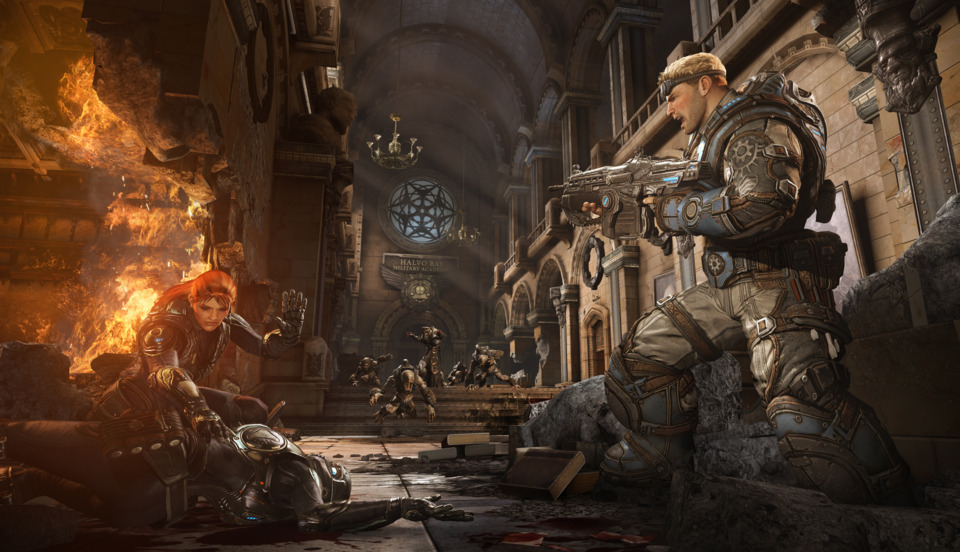
That’s not to suggest these systems are perfect though. For example, the fastest way to boost your Star Meter is through headshots, while the slowest besides just getting regular kills is through obtaining ribbons, and that robs Gears of some of what makes it work. Gears is a game that arose in a sea of shooters that were about methodically popping off headshots, and not that there’s anything wrong with those kinds of games, but Gears’ break from that formula was refreshing. The weapon that has most come to define the series is the Lancer and not because it’s some kind of arbitrary default. The chainsaw attack you can perform with it remains one of the best melee attacks in all of video games, and while we often talk about “bullet sponge” enemies as a failure of design in games, being able to use Gears’ assault rifle to chew through enduring foes is supremely gratifying. For that reason it’s a bit disappointing to see Gears encouraging you to let the whole thing regress into a headshot contest, and its lack of reward for earning ribbons sadly dissuades you from for delving into the more creative and unusual parts of its combat system. I want to be able to close an enemy spawn point with a grenade or chainsaw three enemies to death in a row and have that properly recognised by the game, but it’s not. I was also deterred from taking some of the Declassified Missions on the basis that they would have robbed me of my Lancer. That’s not a huge complaint, but it’s just more fun running around with your chainsaw gun than it is a Torque Bow or Boltok Pistol.
The really odd clash in Judgment is that while the gameplay appears to have arcade game sensibilities, the game also wants to have a pretty involved story and it doesn’t pan out. The witness testimony setup is great for a game in this style, giving a logical reason for changing components of the experience on-the-fly and allowing every character to have their perspective shown. At a basic level Kilo Squad is also primed for some great drama. This is a fall from grace for previously highly-respected soldier Baird, Cole is having to adjust from a life of sports stardom to being just another cog, Sofia is someone trying to deal with her sense of order in a chaotic situation, and Paduk comes to the squad with his tail between his legs, having lost a civil war and now working for his former enemy. You can see how this could all be a recipe for some powerful character moments, but the problem that plagues Judgment is as old as video games themselves. The game doesn’t have the time, space, or tools to establish what it wants to do emotionally.
Any characterisation and exposition that happens is largely limited to the windows in between the combat sections which are the far greater focus of the game, and even a lot of these spots are simply used as a means for the lead character to explain what kind of battle the squad faced next. Most of the cutscenes act primarily as connective tissue, moving the story from A to B instead of creating anything particularly emotionally resonant. Even when we see more human moments from the characters there’s understandably only so much they can or will say while in the middle of trying to fight an actual war, and much of their dialogue is too straightforward and unembelished to make it feel like you’re getting a deep insight into a unique person. The story touches on a more mature theme than any of its predecessors did, but where the characters and plot of previous Gears games felt frequently dumb, here they’re merely boring. The game also makes a format twist at the end that you can see coming a mile off, and by the time you get to it, the ending can’t do anything particularly impressive as the story hasn’t set up the right pieces earlier on. It’s not that surprising to see a Gears story in this state, but the wasted potential behind its initial concept makes it particularly disappointing. Although, to its credit, the end sections of the game contain some of the best uses of light and colour in Gears so far, and while overall Judgment does suffer from the same tonal muddying of previous games, more environmental character does peek through here and there.
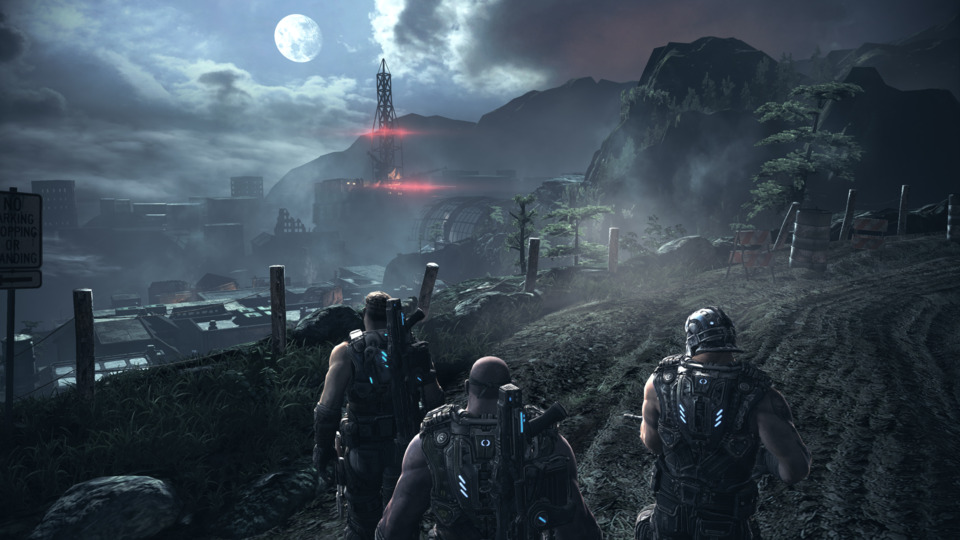
Outside of the Judgment campaign there’s also that Aftermath storyline, provided you’ve collected the stars to unlock it. This one act campaign takes place much later in the Gears timeline and has squad member Sofia Hendrik switched out for the returning Clayton Carmine. This mode makes a very poor first impression, featuring drab environments, swapping a character with a little more personality for a faceless grunt, and removing the unique features like the Star Meter which help this entry stand out. You adapt to the change however, and further in it gets more interesting, even if you never entirely shake the feeling it represents the game backsliding a little. Overall it’s cool to see collectible merits in the game actually add up to allowing you to unlock something as substantial as this, and it’s nice to see this extra chunk of content in the game that doesn’t have to exist there.
A more surprising change however is that Judgment chucks out its Horde Mode, at least in the most literal sense. Instead, the Judgment campaign contains various moments of setting up turrets and taking on waves of enemies in a way that didn’t exist in the previous titles, and it brings together the best of what the two modes are about. The game also offers a “Survival” mode similar to Horde in which you must take on ever-more vicious waves of Locust while protecting a generator and falling back to different maps if the generators are destroyed. There’s also an equivalent of this in the competitive multiplayer called OverRun, which I found to be more enjoyable than the traditional Horde gameplay. Horde had the potential to get drawn out and to be about too much gameplay on one map, but Survival and OverRun keep matches shorter and keep the game moving by instituting a new area of play every time the COG are defeated. I wish I could say I was as big a fan of the other multiplayer modes which are now about COG fighting other COG as opposed to COG fighting Locust, chucking out the game’s diverse classes for more generic human-on-human combat. They also do not feature any damage boost on the Active Reload, and remove the Down but not Out mechanic so that players can’t be revived. It feels like an attempt to place Gears on more square footing with other competitive shooters, but it ends up being a way to further homogenise the competitive shooter landscape and take away Gears’ individual personality. In the hands of Judgment the multiplayer becomes just another gun game. The slight bent in the characters to control in a tank-like fashion also makes the close quarters encounters which are common in a multiplayer like this feel clunky and unwieldy.
Gears of War: Judgment is not a game to be underestimated. You can tune out during story sections and not lose anything, and it makes some missteps in the way it handles scoring and some of its multiplayer, but using your assault weapons and chainsaw to turn enemies into pulp still feels classic, and Judgment’s commitment to change and encouragement towards finding the most gratifying areas of its combat system make it a title not to be scoffed at.
